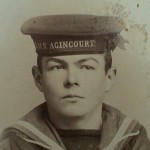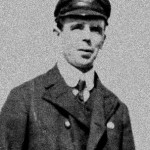
Anna Jarvis, the ‘mother’ of Mother’s Day saw it successfully introduced in 1914. She died unmarried, without children and penniless.
Mother’s Day: Thinking of Mothers Past.
Although we have posted over 200 biographies of the men of Wokingham on this website, many more names have been investigated and in truth, it has at times been hard going. After looking through thousands of photographs of World War servicemen, I admit I had passed the initial shock and was at times just trying the get ‘the job’ completed. I spoke to Sarah Huxford, my research partner, about this desensitisation, commenting that the story constantly repeats itself “it seems they just stood for weeks in a trench and then over the top and dead”. It became an endless tale, which always came out with the same result; researching memorials means you never find a happy ending. Sarah responded simply, “I just think of the poor mothers”. Yes, we concentrate on the stories of the dead and the injured of the Great War, but there were so many more who were involved in the horror. One of our objectives in building up the stories of the men, was to also find out about their family history and this meant we often ‘knew’ the parents as children themselves; they were mostly born in the 1860’s and 1870’s and therefore in their 40’s and 50’s by the time the First War came around. They were a mix of shopkeepers, servants and labourers and often their surnames had existed in the area for hundreds of years. Looking at the story from the point of view of the parents, as Sarah was doing, did indeed bring about another perspective.
On this Mother’s Day of 2014, let us go through how the event came about. It was at the turn of the twentieth Century that a call was made for a recognised day to be put aside to value the contribution the mother makes to the lives of those around her. Although Anna Jarvis of West Virginia, USA started the campaign to create a Mother’s Day in 1908, success only came about in 1914; a date which was to be remembered for other reasons in Europe. Following this success, she became embittered at the commercialisation of the Day and focused her wrath mainly on the printed greeting card; citing such an object as the epitome of laziness. Ironically, for all her efforts to create a special day for mothers, Jarvis herself never married, had no children and died in poverty. The history of Mother’s Day and Mothering Sunday in Britain became fused into one day around Lent and only began to rise in popularity during the 1920’s. What I believe to be significant is that Anna Jarvis insisted on the Day being one of celebrating the individual contribution of each mother, rather than a general thanks to universal motherhood. This meant that each family would pay homage to their own mother. Hence the importance of the apostrophe in Mother’s Day, rather than the plural of Mothers Day.
Returning to the theme of the Great War, as is the main artery through which we tell the ‘Wokingham Remembers’ story, I wondered about the mothers of the men who made their way to war. I quickly began to realise that the mothers’ war time experience was only part of their story; they were coping with more deaths than just those from the war. I never believed my own family story to be particularly different to anyone else’s and my feeling is that we all have an unknown history, which needs to be discovered. I will not go into detail about my family line; there is nothing more boring than hearing about someone else’s uncles and aunts, but I will concentrate on the stories of what the mothers faced; not just in war, but how their individual lives reflect Britain’s general social history of the twentieth century.
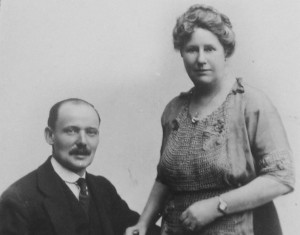
Ada, with second husband Charles. Ada’s first three sons were half German, not a good time in the context of the Great War.
If you are of the Baby Boomer generation; ie, born in the 20 years following WW2, your Great Grandparents would have been born around 1855 to 1875. This is the generation which gave birth to the boys who went to war; I will call them the Mothers of this story and will remember them on this Mother’s Day of 2014. The Mother on my maternal line married a Heinrich Bender and before dying in his thirties gave her three sons. Germany was not seen as an enemy in the 1880’s and as a country itself, it was not much more than ten years old. Of these three half German boys, only one was to fight in the war for the British; the other two having died early from Tuberculosis. The third boy, Ernest joined the Middlesex Regiment and was killed on July 1st 1916, the first day of the Battle of the Somme. The Mother I refer to was named Ada and she had remarried (my Great Grandfather) and had a further three sons. The eldest ran away to join the army underage and the second (my Grandfather) also ran away underage to join the war. Her third son was thankfully too young for war. There is an irony here; this Mother had a reputation for being a real misery, a sour old lady. Ada had lost her three German sons; two with TB and one in the war fighting the Germans. Her next two sons ran away to join the army underage. Had Ada not married an Englishman, with two half German sons, she may have been subjected to the decisions of a paranoid government, which could have seen her even deported to Germany, even though she was a British citizen. I therefore have more than a little respect for her demeanour in the ensuing years.
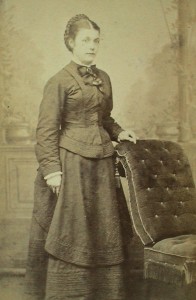
Even before the war, Rebecca had already lost three sons. By the end she had lost four and two more left with TB and Gas poisoning from the trenches.
Another Mother, this time on my paternal side, was a lady called Rebecca (b 1858) and she always prayed for her nine children; except for years I could only find seven. After some time, I discovered Rebecca lost two boys in infancy, Wilfrid and James. Her eldest son joined the Navy and at the age of 18 was buried at sea, having died through blood poisoning in 1907. Antibiotics were not to be discovered until after World War One. By the start of the war, her fourth son was a Customs Officer with three children and in November 1914 was killed during the Bombing of West Hartlepool following a morning attack by the German Navy. Her fifth and sixth sons were to survive the war, but not without damage to their lungs via TB and gas poisoning. Rebecca was known as a warm hearted soul who cared for the children of her son, even through much hardship. Four sons dead, two seriously ill.
What we see here is not, just loss from the war, but families that had already suffered more than their share of pain even before the war had started. Infant mortality, illness and accidents were already cutting deeply into the families well before 1914.
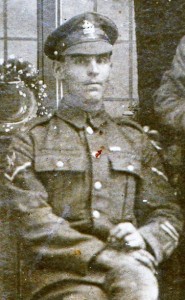
Robert’s mother Sarah gradually watched four sons killed between 1915 and 1918. Robert returned injured from wounds in the shoulder and mouth. An Old Contemptible from the Royal Berks.
I wondered if my experience was particularly different from other families and asked my wife if it would be okay to look into her own. Her uncles were not really very familiar with their history, but were able to tell of their experiences in the Second World War – these stories were harrowing enough. Of their father’s experience in the First World War, their knowledge was understandably sketchy. Understandably, because Robert their Dad, refused to talk about it. I discovered why; he had signed up for the army before the war, as did his four brothers. His mother had been widowed in her thirties and the boys needed to find work as early as they could. He and youngest brother Arthur joined the Royal Berks Regiment and his brothers went into the Royal Artillery, the East Surreys and the Middlesex. Arthur was killed at 2nd Ypres in 1915 and Robert was shot through the shoulder and mouth on the first day of the Somme, July 1st 1916. His brother Charles was killed in 1917 after winning the Military Medal and his third brother John was killed at Passchendaele in 1917. His fourth and last brother Charles was killed during the final push against the German lines at the end of 1918. The Mother, Sarah, a widow now with only a daughter and a single badly wounded son, died not long after the war had ended.
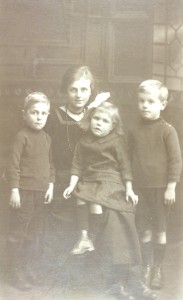
Minnie lost her first husband in WW1 and her second in WW2. Her eight children all became fatherless.
The stories go on and on, but I will stop the detail. Another Mother on my wife’s side lost so many children, she committed suicide. From what I can make out, so far in my family, I am thankful that the older mothers (born 1860’s) had died before the second war and never went through the horror a second time. But the Mothers of the next generation did. Minnie, who lost her husband (during the Bombardment of West Hartlepool) in the first war, lost her second husband in World War Two. From these two marriages, eight children lost a father to war.
This is just part of the story of my family; there is more to tell; more of the losses in the Second War, but it is probably time to bring this to a halt. I really wanted to tell this tale, because Mother’s Day isn’t just about today’s generation, but also spending a few moments thinking about those Mothers of our past, those we never knew, but nevertheless battled their way through horror and inequity in order to get us to where we are today. So to Ada, Rebecca, Sarah and all the Mothers we never knew, we give you our thanks. Happy Mothers Day.
Mike
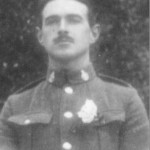
Rebecca’s fifth son, Henry contracted TB in 1916. TB was often a killer during the first half of the 20th century. He survived.
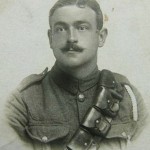
Rebecca’s sixth and last son, Bertie. Served Royal Field Artillery 1915 to 1918. Gassed, but survived.


